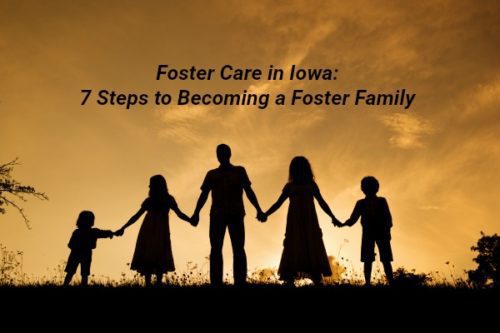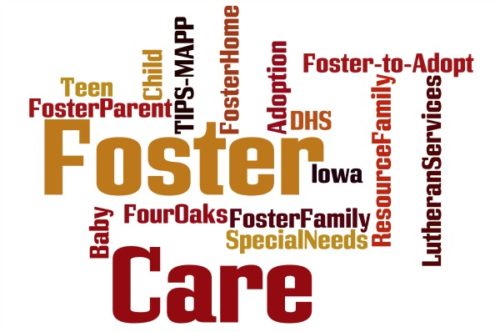In Iowa, at any given time, there are approximately 10,000 children in foster care. These kiddos range in age from newborn to age 18 and are often part of a sibling group. Kids in care are also likely to have significant emotional, physical, or mental health needs. There are always more children in need of a foster home than there are homes available, so the need is real!
Have you ever wondered what it takes to become a foster parent? To kick off Foster Care Awareness Month, this is the first in a series about foster care in Iowa.
Our family has been a foster family for two years. We chose to pursue licensure for several reasons. My first pregnancy was rough for both my son and me, resulting in his arrival 15 weeks early. There was about a 50-50 chance of significant complications with subsequent pregnancies. Some friends adopted a little guy with special needs out of foster care, and we wanted to explore that, too. We felt called to consider foster and adoptive care because we know there is a huge demand. And based on our experiences with our son we have the skill set to take medically fragile babies, so we could fill that need as well.

So, how does foster care work?
Here in Iowa, the Department of Human Services (DHS) works closely with Four Oaks Family Connections and Lutheran Services in Iowa. These organizations are responsible for recruiting, licensing, training, and supporting foster and adoptive Resource Families in Iowa. (Foster/adoptive families are called “Resource Families.”) Johnson and Linn counties work very closely together and are in the Four Oaks service area.
Why and how do children end up in foster care?
DHS removes children from the home for a variety of reasons. Families may be unable to care for their children due to neglect, abuse, failure to provide medical care, drug use in the home, or other things that lead to an unsafe environment for children.
When a child is removed, DHS arranges temporary care for that child, often with a relative. If relatives are not available, DHS will make a referral to Four Oaks or Lutheran Services who will place the child or children with a foster family. This would be a family who (preferably) lives within 20 miles of where the child was living and who will support ongoing connection and relationship between the child in care and his or her family of origin. This removal and placement process is collaborative among DHS, the court system, Four Oaks/Lutheran Services, and foster families.
One thing many people don’t realize is that the primary goal of foster care is reunification of the child with the family. In fact, approximately 70% of children in foster care are reunited with their birth families or adopted by relatives.
What are the requirements to become a foster parent in Iowa?
You must be at least 21 years old and able to provide a safe and stable home environment. You must have a strong desire to support, encourage, protect, and advocate for children. You must be willing to work with birth parents by supporting frequent family visits and maintaining phone/text/email communication with them as well as any siblings. In addition, you need to have a flexible mindset, a sense of humor, a good support system, realistic expectations, a positive outlook, and healthy self-esteem. I often tell people that foster care isn’t for the faint of heart!
What is the process for becoming a foster family in Iowa?
There is a multi-step process including a truckload of paperwork (kidding, not kidding!), extensive training, background checks, and home visits. Generally it takes about six to nine months from filling out your initial interest form to receiving your foster care license, but it can vary, depending on how long the wait is to take the foster care classes and how great the current demand for homes is. We went through the entire process in a little under five months.
Here are the general steps for becoming licensed as a Resource Family:
1. Fill out an inquiry form online.
This form includes demographic and contact information for the people who live in your home. You share a bit about which children you would feel most comfortable working with: age range, gender, special needs, behavioral aspects, etc. The form also asks for your ability to commit to the 10 weeks of training and your ability to support a foster child financially.*
*Although a portion of foster care expenses are covered by the state, the stipend isn’t enough to fully support each child in care.
2. Attend an informational meeting.
This 1-2 hour meeting provides information about foster care in Iowa including current needs, the goals of foster care, the requirements of foster families, etc. After filling out your inquiry form, you’ll be contacted with potential dates to attend this meeting. Since Johnson and Linn counties work very closely with one another for foster care, your meeting could be in Iowa City or Cedar Rapids.
3. Fingerprinting and background check
All prospective foster parents are required to be fingerprinted and undergo a criminal background check. A “hit” on the criminal record doesn’t necessarily prevent someone from becoming a foster parent. The individual will have a chance to explain the situation in writing for DHS to make a final decision.
4. TIPS-MAPP Training
Trauma Informed Partnering for Permanence and Safety: Model Approach to Partnerships in Parenting is a 30-hour class that meets 3 hours once a week for 10 weeks. This class will teach you about the children in foster care and the unique challenges they face; state laws as well as rules and regulations (i.e., “dos and don’ts of foster care); how to interact with birth families; tools for discipline and behavior management; strategies for handling many specific situations you may encounter; and much, much more. You will also spend time examining your motivation for wanting to be a foster parent, the characteristics of children you feel most equipped to help, and how your childhood, background, and current family situation impact your perspectives and approaches to foster care.
You may not miss the first class of TIPS-MAPP training or any subsequent class unless it’s an emergency or you have prior approval. If you do miss a week, you still have to complete the classwork. I was sick one week during our training and can tell you that the homework is more intense than actually attending the class! If you miss more than two classes, you may have to re-start the classes during the next available session.
5. Additional Training
In addition to TIPS-MAPP, all foster parents must be certified in CPR/First Aid and as a Mandatory Reporter for Child/Dependent Adult Abuse. You also take Medication Management and Reasonable and Prudent Parent Standard training. Once licensed, you are required to have six hours of in-service training each year, three of which must be face-to-face. The other three may be online. Your CPR and Mandatory Reporter training count toward this total in years you are required to have those hours.
6. Home study
You will complete an extensive home study which includes providing a TON of information, such as things about your childhood and family of origin, your family’s values and beliefs, specific characteristics of children you are able to foster, personality and relationship details about everyone living in your home, and more. You will be asked to provide a map of your home including things like number and heights of windows, location of smoke and carbon monoxide detectors, dimensions of bedrooms, emergency safety plans, etc. You will receive guidance on locking up prescription and over the counter medications, making sure any firearms are appropriately stored and locked, and keeping hazardous chemicals stored safely. Your Licensing Worker visits your home several times to talk with you, look at your home, and generally just get to know you!
7. Licensing
At the end of this process, your documentation is reviewed for completeness to ensure you have done all the work required for foster care licensing. Several weeks after everything is submitted, you will get your foster care license! You will be licensed for a specific number of children, depending on the space in your home. (We are licensed for two children.) You will undergo the home study process again for your first and second annual renewals as a Resource Family. After that, licenses are typically renewed every two years.

Is foster care for you?
Toward the end of your training class, you will be asked your preferences. What age range/gender/race/etc. child(ren) would you prefer or are best suited to foster? Are you interested in foster care only, foster care or adoption, or just adoption? We currently provide respite care which is designed to give foster families a break or provide care if a foster family is traveling, for example. What special needs are you comfortable handling? Are you open to sibling groups or just individual children?
I am a big fan of figuring out “What is my why?”. Why do we want to do this? What is our motivation? For foster care, maybe you love kids and want to help. Maybe you feel called to foster care from a moral or religious standpoint. Maybe you want to grow your family, and foster-to-adopt is a good option for your family. These are all important questions which require introspection and an honest assessment of your family’s situation. They are not easy questions. But remember the bottom line: the choice must be the best one for your family so that you are able to provide the best care for a child coming out of a hard situation. Whatever the reason behind your desire, you are awesome and filling a great need in our communities!
Stay tuned for the next installment which will go into more detail about the kids in care in Iowa and the greatest needs in foster care.
Additional foster care resources:
Iowa Foster & Adoptive Parents Association
Families Helping Families of Iowa











where can I do the Trauma Informed Partnering for Permanence and Safety training in Ottumwa iowa
Hello , I’m interested in becoming a foster parent.
Thank you
I want to become a foster parent thank you
I would love to become a foster parent please send me information
Is there an age limit for going thru this process to help? Otherwise, can retired people do this also?
What # can We call to foster or adopt. Looking for 5 -10 year boy. What are the first steps?